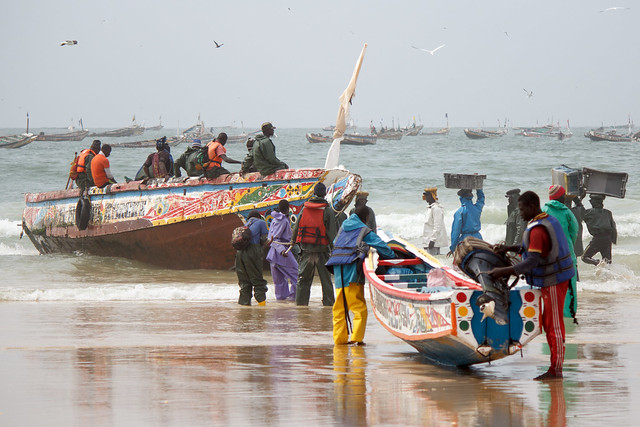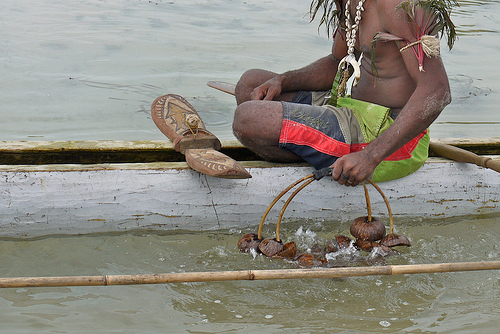How will the Changing Oceans affect Human Health?
The latest report from the International Panel on Climate Change (IPCC) highlights how the most vulnerable human communities will be affected by a rise in sea-levels and increases in ocean temperatures.
The Special Report on the Ocean and Cyrosphere in a Changing Climate (SORCC) talks about how changes to key-ecosystem services will severely affect human and environmental health, threaten food security and increase the risk of disease.
Our oceans are inherently important to our way of life. The ways in which humans benefit from any natural phenomenon is termed eco-system services. The ocean provides us with food and generates income for countless families across the world. In 2000, global fish catches directly generated over 80 billion US dollars. Our oceans also help to mitigate climate change by providing various regulating services. Marine ecosystems have the ability to absorb and store carbon dioxide thereby removing it from the atmosphere (carbon sequestration). This happens in all marine ecosystems from the deep seas to tidal wetlands, which play a large role in carbon removal. Coastal marine ecosystems such as mangroves and coral reefs also help protect lands from the storm impacts, erosion and sea-level rise. Oceans also hold cultural significance, providing benefits via tourism, recreational activities and help form a cultural identity. For example communities in New Ireland, Papua New Guinea hunt mako sharks by ‘singing’ to them, luring them to the surface. These religious fishing ceremonies are an important aspect within the Malanggan culture (Messner, 1990).
As global sea temperatures rise, marine life and such ecosystem services become increasingly threatened and unstable. Communities with the closest ties to the oceans are most vulnerable to these changes and uncertainty lies ahead. The SORCC highlights just how human wellbeing is likely to be affected.
Water-borne diseases such as cholera are predicted to become more common throughout the world. The bacteria prefer warmer sea temperatures, unnaturally high nutrients levels and lower levels of salinity. Cholera killed 650,000 people in 2010 alone. Levels of cholera causing bacteria have dramatically increased in the North Sea and towards the poles. Its range is predicted to double in the Baltic Sea by 2050. Increases in extreme weather events (flooding and tropical cyclones) also increase exposure of the bacteria to people. The WHO has described cholera as an indicator of inequity and lack of social development. The easiest way to prevent and control the disease is by having access to clean drinking water and basic sanitation. Therefore, the increased likelihood of outbreaks due to climate change is going to affect the world’s poorest communities.
Different types of ocean contaminants also pose a greater risk to human life and marine biodiversity in light of climate change. Ocean acidification and rising temperatures can increase the uptake of such containments like mercury and persistent organic pollutants (POPs). This accelerates the bioaccumulation of them, affecting top predators the most (such as marine mammals). Such climate-related pollution will cause long-term health affects in those communities who heavily rely on the oceans for food. Arctic indigenous communities and other coastal indigenous communities are particularly at risk due to their close traditional ties to the seas.
Seafood contains all the essentials for human health. It provides us with protein, fatty acids and other nutrients. However, fisheries (globally and locally) are at risk due to climate change especially in lower latitudes that are already suffering in terms of food security. Dramatic decreases in maximum catch potentials have been predicted within the tropics, especially in the Pacific Islands and western and central Africa. For instance, 50% of the commercially fished species in the Pacific Islands are likely to become locally extinct by 2100. The effect on human health is further exacerbated in these regions due to the already stressed land-based food production. The eastern central Atlantic and the western Indian Ocean is also predicted to see decreases in catch potential. Changes in catches are primarily due to changes in plant matter (chlorophyll), which support the entire ecosystem and changes in sea-surface temperatures. Fish stocks also depend upon previous levels of fishing intensity. Across the world we are seeing an increased dominance of warm water species outcompeting or replacing native species. This is altering the distribution and composition of the world’s fisheries. Climate is also decreasing the nutritional quality of seafood, reducing lipids, protein and omega-3 fatty acids. Coastal communities that are heavily reliant on seafood are more vulnerable to climate related food insecurity due to their potential lower ability to adapt to such changes. If communities have traditionally seafood-based diets, the switch to more processed foods will have detrimental health affects. This has lead to the rise in obesity and diabetes.
Finally, both indigenous and non-indigenous communities gain many cultural values and customs from the marine environment. Hence, the loss of certain species with religious or aesthetic values will negatively affect such communities’ well being.
References:
Bindoff, N.L., Cheung, W.W., Kairo, J.G., Arstegui, J., Guinder, V.A., Hallberg, R., Hilmi, N., Jiao, N., Karim, M.S., Levin, L. and ODonoghue, S., 2019. Changing ocean, marine ecosystems, and dependent communities. In IPCC special report on the ocean and cryosphere in a changing climate .
Messner, G.F., 1990. The Shark-Calling Ceremony in Paruai, New Ireland, Papua New Guinea. The World of Music , 32 (1), pp.49-83.
SHARE THIS ARTICLE















